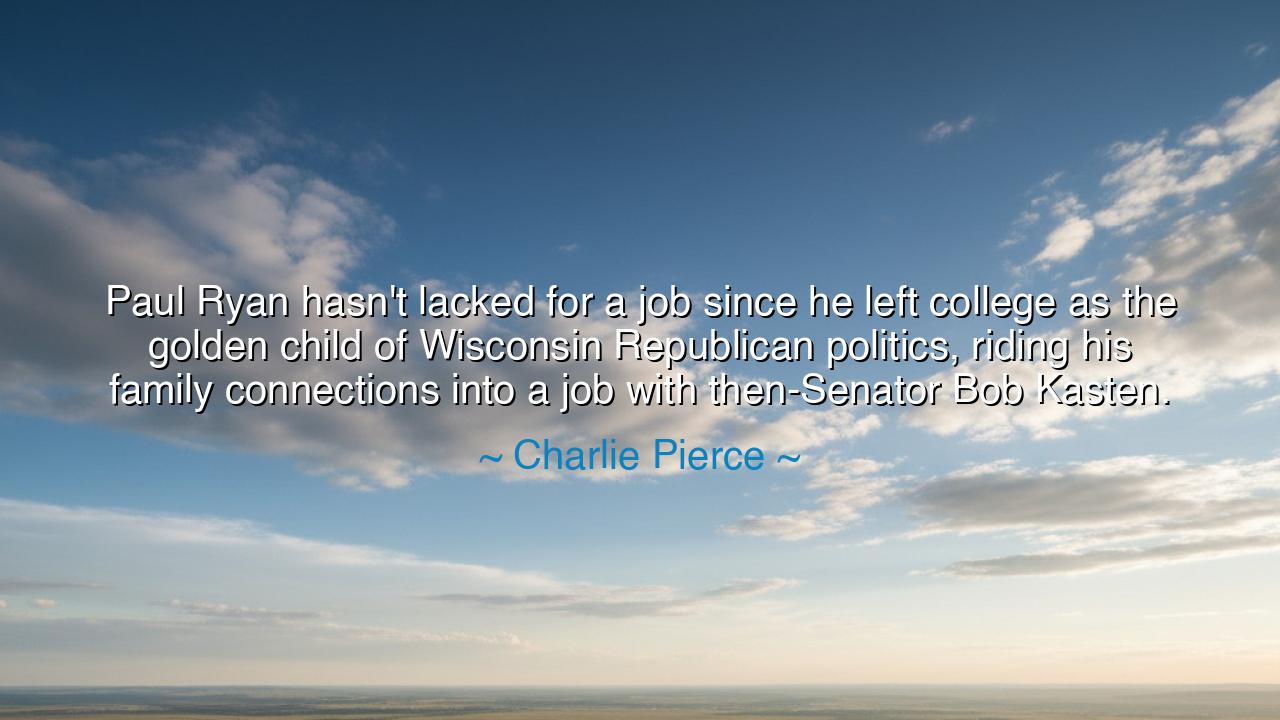
Paul Ryan hasn't lacked for a job since he left college as the
Paul Ryan hasn't lacked for a job since he left college as the golden child of Wisconsin Republican politics, riding his family connections into a job with then-Senator Bob Kasten.






The words of Charlie Pierce, “Paul Ryan hasn't lacked for a job since he left college as the golden child of Wisconsin Republican politics, riding his family connections into a job with then-Senator Bob Kasten,” strike as both revelation and caution. They unveil the ancient truth that fortune is not always earned by sweat or struggle, but often bestowed by connections, lineage, or favor. To be the golden child is to walk a road cleared by others, where doors swing open not by merit alone but by heritage and circumstance.
The ancients knew this truth all too well. In the courts of kings, it was often not the bravest warrior nor the wisest sage who ascended, but the one who bore the right name, who sat at the right table, who was chosen by the winds of politics. Favor can elevate swiftly, but it also binds, for the one raised by connections must forever prove that his worth is not borrowed. Thus, Pierce’s words are not merely about Paul Ryan, but about the eternal tension between merit and inheritance, between earned triumph and bestowed privilege.
History gives us echoes of this struggle. Consider the young Alexander of Macedon, who inherited his father Philip’s empire, armies, and alliances. His connections were his birthright, and many scoffed that he was but a boy carried by fortune. Yet in time, through conquest and vision, he proved himself not merely the son of Philip, but Alexander the Great. Here lies the lesson: to begin with favor is not shameful—but to rest upon it, without proving one’s own strength, is to remain forever in another’s shadow.
Pierce’s words also carry warning for the people. When leaders ascend not by toil but by family ties and patronage, the republic risks decay. For a government led by privilege rather than by service may forget those who have no such ties. The people must ever be vigilant, weighing not only the name of the leader, but the substance of his deeds. For the mantle of power should rest upon character and vision, not solely upon lineage.
Let this teaching endure: fortune may set one upon the path, but it cannot walk the road for him. The golden child may glitter at the start, but true light is proven only in trial, when privilege fades and character is tested. And so it is for every generation to ask: do we follow those who are merely carried by connections, or those who, like tempered steel, prove their worth in the fire of service?






PTpham phuong thao
From a voter’s seat, the bigger issue is pipeline health. If early jobs cluster among the well-connected, then local voices—especially working-class, rural, and first-generation grads—stay underrepresented in national policy. What would a serious fix look like: travel stipends for interviews, housing support for junior staff, mentorship programs run by nonpartisan groups, and independent watchdogs auditing staff diversity by background? Closed question: when evaluating a politician’s proposals, should we weight them differently if their staffing ecosystem shows narrow recruitment? I’m craving criteria that reward widened access.
VH10- Nguyen Van Hoa
Part of me wants to hold two thoughts at once: someone can benefit from privileged entry and still be genuinely capable. The fair test is outputs, not origin myths. How do we evaluate policy professionals in ways that separate biography from consequence? I’m imagining a public scorecard: legislative impact, oversight rigor, district service metrics, and coalition breadth. Open question: when résumé advantages are obvious, should we demand higher transparency and stricter conflict-of-interest standards as a compensating check, or is that an unfair double bind?
NLLang Thi Ngoc Lan
I worry about the downstream effect on civic trust. When political ascent looks preordained by family ties or donor networks, people disengage, assuming the game is fixed. What structural antidotes are realistic—universal paid internships on the Hill, blind résumé rounds for entry-level roles, or cooling-off periods between campaign work and legislative staff jobs? Closed question: should offices be required to publish anonymized hiring statistics by role and channel (referral vs. open posting) to spotlight bottlenecks where gatekeeping quietly thrives?
GDGold D.dragon
The phrasing about a “golden child” reads like a media frame that both critiques privilege and sells a tidy narrative. I’m uneasy: it risks collapsing a complex career into a single origin story. How should journalism balance origin scrutiny with evidence of actual competence or failure—votes cast, budgets shaped, legislative coalitions built? Closed question: would you support newsroom checklists that pair biography claims with measurable policy outputs, so readers get more than character sketches and can judge performance against opportunity?
NNBao Ngoc Nguyen
As a reader, I’m struck by how early-career networks can harden into lifetime trajectories. It makes me wonder how much of political hiring is merit screening versus social proximity tests. If access is the differentiator, ordinary constituents end up with a talent pool filtered by lineage and loyalty. Should congressional offices publish transparent pathways—paid internships, open competitions, and standardized skills rubrics—to blunt the edge of insider referrals? I’d love concrete examples of hiring models that dilute patronage without dulling the need for trusted staff.